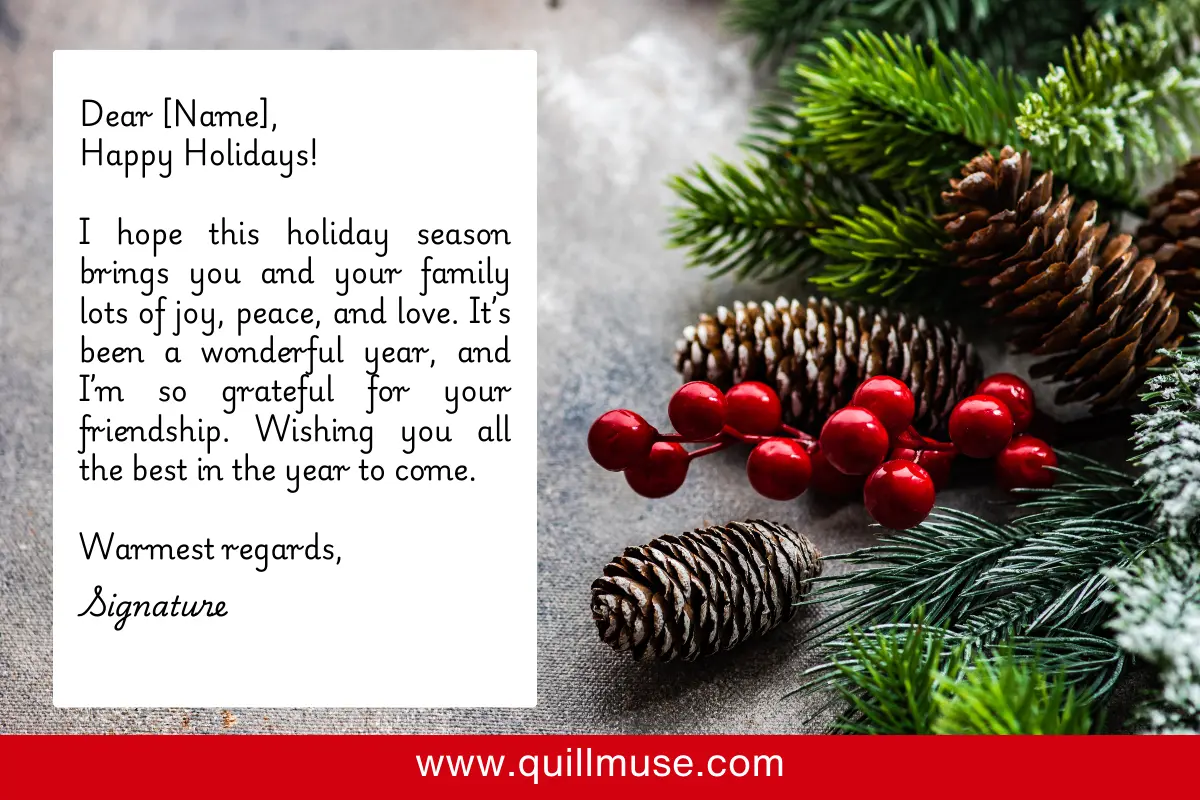How to Write a Holiday Card: Steps, Tips, and Examples
In this article, you’ll discover how to create meaningful holiday cards that truly resonate with your recipients. From choosing the perfect card to crafting heartfelt messages, you'll find practical tips and examples to help you personalize your greetings for friends, family, and colleagues. So, let’s get started—spread some joy this holiday season with your words!

Murad Khan
Last updated on Sep 21st, 2024

When you click on affiliate links on QuillMuse.com and make a purchase, you won’t pay a penny more, but we’ll get a small commission—this helps us keep up with publishing valuable content on QuillMuse. Read More.
Table of Contents
How to write a holiday card is a question many people find themselves asking as the festive season approaches. Sending a holiday card is a heartfelt way to express your good wishes to family, friends, and colleagues. But knowing what to write can be challenging. Whether you’re aiming for a formal greeting or a personal message, crafting the right words is key to making the card meaningful. In this article, we’ll break down how to write a perfect holiday card, share tips to enhance your writing, and provide example messages you can use.
What is a Holiday Card?
A holiday card is a greeting card sent to convey festive wishes during holiday seasons, such as Christmas, Hanukkah, New Year, or other cultural celebrations. These cards can be handwritten or printed and often feature designs that reflect the holiday spirit. They serve as a means to maintain connections and spread joy, expressing sentiments of goodwill, love, and appreciation.
Why Holiday Cards Matter
Holiday cards are more than just a seasonal tradition; they serve as a way to maintain and strengthen relationships, offering a personal touch in an increasingly digital world. A thoughtfully written holiday card can express gratitude, affection, and best wishes, becoming a cherished memento for the recipient.
Read more: How to Write a Postcard
How to Write a Holiday Card: Step-by-Step Guide
Choose the Right Card
Start by selecting the right type of card. The design and format should match the tone you want to set—be it casual, professional, or deeply sentimental. Here are some options to consider:
- Photo Cards: Perfect for family updates or sharing pictures of kids and pets.
- Traditional Cards: These often feature festive designs, ideal for formal or heartfelt messages.
- Custom Cards: Personalized cards can reflect your unique style and personality.
Know Your Audience
Tailor your message to the recipient. A card sent to a close friend will likely have a different tone than one sent to a colleague or business associate. Keep in mind the holiday they celebrate, their values, and your relationship with them.
Start with a Warm Greeting
Opening your card with a thoughtful greeting sets the tone for your message. Some simple but effective greetings include:
- “Happy Holidays!”
- “Season’s Greetings!”
- “Wishing You a Merry Christmas and a Happy New Year!”
If you’re close with the recipient, you can add their name:
- “Dear [Name], Happy Holidays!”
Craft Your Message
The heart of your card lies in your message. Keep it simple and sincere, and be mindful of your recipient’s personality. Here are some pointers:
- For Friends and Family: Personal, heartfelt, and warm. Mention fond memories, shared experiences, or express your excitement for the new year.
- For Business: Professional and respectful. Thank them for their support or partnership throughout the year, and offer well wishes for the upcoming year.
- For Colleagues: Maintain professionalism but add a friendly touch. Show appreciation for their collaboration.
Tips for Writing Holiday Card Messages
- Be personal. Reference specific events or conversations if applicable.
- Use positive and uplifting language.
- Keep it concise; there’s no need for lengthy paragraphs.
- Consider including a holiday-related quote or saying.
Close with a Warm Sign-Off
Your closing should mirror the tone of your message. Some examples include:
- “Wishing you all the best!”
- “Warmest regards,”
- “With love and joy,”
- “Best wishes for the New Year!”
Include a Personal Signature
If the card is going to someone special, signing your name by hand adds a personal touch that printed text can’t match. For business cards, you might want to include your full name and title.
Read more: Most Common Mistakes in Writing

Example Holiday Card Structure
Greeting: “Dear [Name], Happy Holidays!”
Message: “I hope this holiday season brings you and your family lots of joy, peace, and love. It’s been a wonderful year, and I’m so grateful for your friendship. Wishing you all the best in the year to come.”
Closing: “Warmest regards,”
Signature: [Your Name]
Example Messages for Holiday Cards
Warm Wishes for a Joyful Holiday
Dear Mom and Dad,
I can’t express how much I treasure the memories we’ve made together over the years. As the holidays approach, I find myself reminiscing about all the special moments we’ve shared. I am so grateful to have you in my life. Wishing you a season filled with love, laughter, and all the things that make you happiest.
With all my love,
[Your Name]
Read more: How to Write a Eulogy
Professional Holiday Greeting
Wishing You Continued Success
Dear [Client’s Name],
As we wrap up another year, I want to express my sincere appreciation for your trust and collaboration. It has been a pleasure working with you, and I look forward to continued success in the coming year. Wishing you a prosperous and joyous holiday season!
Best regards,
[Your Name]
Friendly Holiday Message for a Colleague
Thank You for a Wonderful Year
Hi [Colleague’s Name],
It’s been an absolute pleasure working alongside you this year! I’m so grateful for your support, and I couldn’t have asked for a better team member. Wishing you a restful holiday season and looking forward to achieving more great things together next year.
Cheers,
[Your Name]
Holiday Wishes for a Friend
Cheers to Another Year of Friendship
Dear [Friend’s Name],
I can’t believe another year has flown by! I’m so lucky to have you in my life. Here’s to another year full of laughs, memories, and adventures. Wishing you the happiest of holidays and a New Year that’s even better than the last!
With love,
[Your Name]
Additional Tips for Writing Holiday Cards
Customize Your Message
If you’re sending a holiday card to multiple people, don’t use the same generic message for everyone. A little customization can go a long way in making your cards more meaningful. Even a small change like mentioning the recipient’s name or referencing a shared memory adds a personal touch.
Use Humor Sparingly
Humor can be a great addition to holiday cards, but be mindful of your audience. What might be funny to one person could be offensive or confusing to another, especially when sending cards in a professional setting.
Avoid Sensitive Topics
Keep your message light and joyful. Avoid topics that could be seen as divisive, such as politics or controversial issues.
Consider Handwritten Notes
A handwritten note adds a personal, thoughtful touch to your card. While typing your message might be more efficient, handwriting—even just a sentence or two—can make the recipient feel truly special.
Frequently Asked Questions
What Should I Write in a Holiday Card for Someone I Don’t Know Well?
When writing a card for someone you don’t know very well, keep the message simple and polite. Stick to general holiday wishes and avoid overly personal details. For example, you could write:
“Happy Holidays! Wishing you joy and happiness throughout the festive season and the coming year.”
How Can I Make a Business Holiday Card Stand Out?
A business holiday card should remain professional while still feeling personal. Acknowledge the partnership or relationship you’ve built over the year, and express your gratitude. Be specific and reference achievements, collaborations, or shared goals where appropriate. Closing with a warm holiday greeting makes it memorable.
Is It Okay to Send Digital Holiday Cards?
Yes! In today’s digital world, sending e-cards has become a popular and environmentally-friendly option. However, physical cards often feel more personal and special, so if possible, send a handwritten card to those who are closest to you or in professional settings where it’s more appropriate.
How we've reviewed this article
Our content is thoroughly researched and fact-checked using reputable sources. While we aim for precision, we encourage independent verification for complete confidence.
We keep our articles up-to-date regularly to ensure accuracy and relevance as new information becomes available.
- Current Version
- Sep 21st, 2024
- Sep 21st, 2024



